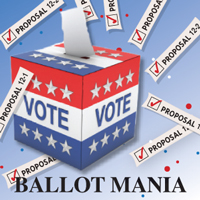Genesis of Prop 2 found in Right to Work debate
For years, it was unthinkable that Michigan, the cradle of the labor movement, might ever become a Right to Work state. Union workers helped build the state, union power shaped its politics and the idea of severing the two would be like Georgia rejecting peaches.
Things are different now.
The battle over Proposal 2, which would put collective bargaining rights in the state constitution, demonstrates how the players surrounding the issue have changed. Sparked by threats to public-employee unions in Wisconsin and Ohio, numerous labor groups banded together to form Protect Our Jobs (later changed to Protect Working Families), which is funding the effort. The pushback has come from Citizens Protecting Michigan’s Constitution and Protecting Michigan’s Taxpayers, two entities with ties to the state Chamber of Commerce and other business groups.
If Proposal 2 passes, the obstacles to Right to Work legislation, which does not require union membership or financial support from those working in a union shop, are considerable -- a constitutional amendment isn’t easily gotten around. But if it fails, what then?
"I don’t speculate on what will happen," said Jared Rodriguez, president of the West Michigan Policy Forum, a group that has made passing RTW a priority in its three-year history. "We need all the opponents to get (the message) out to Michigan voters of the extreme detrimental impact this will have on our state" if Proposal 2 passes.
Indiana joins RTW ranks
In the past, RTW states have been clustered in the South and West. But earlier this year, Indiana Gov. Mitch Daniels signed the first Right to Work bill in the manufacturing Midwest. The reaction so far has been mixed.
Indiana’s Economic Development Corporation, a state agency, claimed in a recent update to state business leaders that since the bill’s signing in February, "83 companies have communicated that Indiana’s enactment of right-to-work will factor into their decision-making process of where to locate current projects," and 66 of those have progressed to "the pipeline stage," with a potential of 8,200 new jobs. Officials at six companies publicly announced that the RTW bill was a factor in their decision to expand in the state; five were already Indiana-based companies. One, however, was based in Michigan – Android Industries of Auburn Hills, which in March announced an expansion to Fort Wayne, Ind., with up to 66 jobs.
"Android chose Indiana and specifically Fort Wayne because it's both an employee- and employer-friendly environment," David Donnay, the company’s vice president of human resources, said in a statement released by the IEDC. "Recently, Indiana became a right-to-work state and offers us a competitive location and a skilled work force to complement our state of the art technology."
Other companies have said RTW is only one of the many factors considered in business strategizing. Shortly after the Indiana bill was signed, a state-issued press release named MBC Group as one company expanding because of RTW, but the company’s president denied it.
"We are not a union shop. The effect that this was going to have was not going to affect our decision one way or another," said Eric Holloway, in a story carried by the Associated Press.
Kevin Brinegar, CEO of the Indiana Chamber of Commerce, said the state’s economic-development agencies are watching Michigan’s election closely, and, he joked, "repaving the highways near the border" for Michigan businesses looking to relocate, should Proposal 2 pass.
"This data in just eight months has exceeded our most optimistic expectations," said Brinegar.
Jeff Harris, spokesman for AFL-CIO Indiana, said the state's economic-development office isn't a reliable source of data on RTW, calling it "a political wing of the governor's office." RTW may be a factor in some businesses' decision-making, but it is far from the only one.
Over time, though, he said organized labor expects the effect of the law to be bad for the state, as wages and benefits fall.
"It's the low road to economic development," Harris said. "The immediate impact we're not seeing yet, as a lot of contracts are still in place. But anecdotally, we're hearing about more aggression of employers toward employees at the bargaining table." Those employers, he said, are "pushing back on everything from benefits to bathroom breaks."
The Policy Forum's Rodriguez believes Michigan voters should take note of Indiana's experience.
"I think what Indiana did in their effort spoke volumes to the country, the Midwest and job providers globally," he said, adding that voters need to ask "What kind of future do we want as a state? Do we want to muddle in the past or a future economy that encourages job providers to invest in our state?
"The business community didn’t bring this fight to Michigan," he said. "Union bosses did."
Staff Writer Nancy Nall Derringer has been a writer, editor and teacher in Metro Detroit for seven years, and was a co-founder and editor of GrossePointeToday.com, an early experiment in hyperlocal journalism. Before that, she worked for 20 years in Fort Wayne, Indiana, where she won numerous state and national awards for her work as a columnist for The News-Sentinel.
See what new members are saying about why they donated to Bridge Michigan:
- “In order for this information to be accurate and unbiased it must be underwritten by its readers, not by special interests.” - Larry S.
- “Not many other media sources report on the topics Bridge does.” - Susan B.
- “Your journalism is outstanding and rare these days.” - Mark S.
If you want to ensure the future of nonpartisan, nonprofit Michigan journalism, please become a member today. You, too, will be asked why you donated and maybe we'll feature your quote next time!


